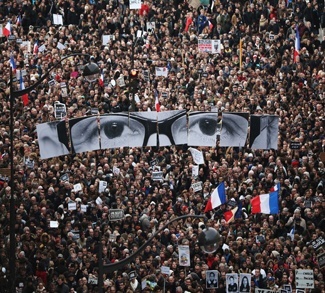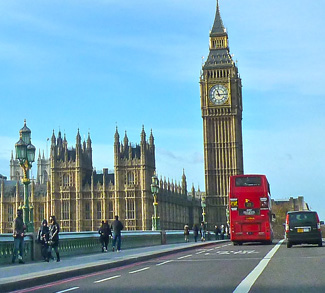In terms of genuine policy analysis, it is much too soon after Charlie Hebdo to draw conclusions and make recommendations. That is best left to the journalists, and those with agendas, axes to grind, knees to jerk. And while even the journalists concede there are too many unknowns at present to reach any definitive conclusions, there is no shortage of folks in the latter category, who are quite sure they have it all figured out.
For want of a better term, these folks may be divided into two opposite camps. We are all familiar with the populist segment, where the “vulgar” version of the argument traces back to the neoconservative tenet that Islam itself is the problem. This group contends that “radical” Islam is a redundant phrase. Therefore, the answer is a more aggressive Western military policy in the Middle East and a “Homeland Security” recipe for Europe. Shoot from the hip.
There are grains of truth in this argument, but just grains. Other voices are strong enough in their public reservations over this approach that there is no need to challenge it here.
Far more dangerous, and therefore the subject of this article, is the even more perverse claim that Western imperialism is the cause of radical Islam’s grievances. In particular, so the argument goes, America’s post 9/11 “War on Terror” Crusade that linked Al-Qaeda and fictional WMDS to Saddam Hussein’s Iraq in the Second Gulf War. In turn, of course, Saddam’s removal created the vacuum that led to the rise of ISIL.
This neoliberal approach, for want of a better term, is far more dangerous because most of the cited facts and sequences are in large part true. The real problem of the argument is where it stops, and the final conclusion that it draws. The proponents of this view stop just short of Obama’s premature exit from Iraq in their narrative tracing ISIL’s rise. Moreover, the rise of ISIL and its link to Charlie Hebdo is perhaps even more fictitious than that of Saddam to the WMDs.
Before we set out to prove this neoliberal argument false, we must first debunk anticipated criticism that this a straw man. In short, we need to prove that the view is widespread and held by people of power and influence, not just paranoid conspiracy theorists and self-referencing internet bloggers and false-flaggers/inside-jobbers.
One needn’t look far. This is the thrust of the explanation and prescription from Juan Cole to Tayip Erdogan. A good “mainstream” example of this thinking is found in the respectable and centrist Atlantic. In “France Declares Its Own ‘War on Terror,” Matt Schiavenza worries that Paris is on course to imitate Bush Junior’s “failed” policies in Iraq with a real risk of an-Abu Ghraib type reaction that provokes further Islamic radicalization.
Cole, of course, goes much further: “Having American troops occupy it [Baghdad] for 8 years, humiliate its citizens, shoot people at checkpoints, and torture people in military prisons was a very bad idea. Some people treated that way become touchy, and feel put down, and won’t take slights to their culture and civilization any longer. Maybe the staff at Charlie Hebdo would be alive if George W. Bush and Richard Bruce Cheney hadn’t modeled for the Kouachi brothers how you take what you want and rub out people who get in your way.”
This type of polemic cannot go unanswered. It is both reckless and undignified. More to the point, it is loaded with the excessive and “context-devoid” moralism that is the hallmark of hyper-liberal critiques of foreign policy.
The first realist critique is just to point out selective fact usage. Whether moral or not, the US “occupation” of Iraq had very little to do with the rise of ISIL. Sure, Bush’s war led to the demise of Saddam, but neither that nor the American troop presence facilitated ISIL. On the contrary, the immediate facilitation was a lack of US troops. It was the premature withdrawal that created the vacuum before a functional Iraqi government – democratic or not – could take root.
That is what realism is, folks: a clear view on the role of military action as a tool for diplomatic interests in an anarchical world of nation states. Everyone – everyone who is honest and has read – knows that a stable dictatorship is better than a lawless vacuum. Anarchy, except for the briefest of moments as a dictator is toppled, is neither freedom nor democracy.
The second realist critique of this neoliberal view is that it is evident Al-Qaeda, ISIL, and other terror groups have morphed from rogue elements either outlawed or tolerated by a host of Arab/Islamic states into true global movements. These are organizations with deep roots in Western countries with significant Islamic populations. Where an element of the Western Islamic population is vulnerable to being attracted to these perverse misrepresentations of Islam, Western policy in the Middle East is almost irrelevant. The cruel irony that the neoliberals never mention is that President Obama – in a decisive break from Bush policy – determined to reduce US intervention in the Middle East to a minimum with the explicit goal of undercutting the perceived basis for radical Islamic growth.
Who can argue that Obama helped trigger the Arab Spring with his Cairo Speech? Obama’s determination to allow friends like Mubarak to fall in favor of anti-Western fundamentalists such as Morsi, to refuse to intervene in Syria, and to support diplomacy with Iran means that the current president follows a clear policy of non-provocation with Islam. Obama refuses to even associate the word ‘Islamic’ with ‘terror’ in the same sentence. For all his efforts, however, Obama is seen as weak and unreliable by both friend and foe alike in the Middle East. If anything, the president’s late response to Syria and ISIL has emboldened and grown the movement, not deflated it. His absence from the Paris March, it seems, is a calculated decision not to “offend” as opposed to the oversight angle spun by the White House staff.
On a more obvious level, consider France itself: No European democracy has distanced itself more from US policy than Paris. After the Six-Day-War, France imposed an arms sale embargo on Israel. In 1973, France refused to allow the American airlift to Israel to overfly French soil. At the 11th hour in 1991, France argued that Saddam should be given one more chance for diplomacy with a direct link applied to Kuwait and Israeli withdraw from the West Bank. In 2003, France refused the WMD premise as pretext for the Second Gulf War. Just days before the attack on Charlie Hebdo and a kosher supermarket, France adopted the unprecedented Western position of co-sponsoring a UN Security Council Resolution in support of Palestinian statehood.
Need one ask – even of the neoliberals – what France received in return for its “progressive” policies towards the Middle East?
Perhaps the ironic point of convergence between neoliberal and neoconservative thought on Charlie Hebdo is that the model for analysis is “supranational” and thus beyond the grasp of either perspective.
The neoliberals are desperate to blame the Western state system and Crusader imperialism, while the neoconservatives are desperate to blame the Arab state system and exported Islamic fundamentalism.
The failure of neoliberal interpretation should now be clear. We would be remiss, however, if we did not challenge the idea that exported Islamic fundamentalism is the main problem at the moment. In yet another irony, we see that some of the most fundamentalist Islamic state systems and players of different Shia, Sunni, and Wahhabi stripes are not the immediate culprits here. There is no doubt Iran has exported terror in the past (Argentina) and continues to do so via Hezbollah and other proxies. The Iranians, however, are as unnerved by Sunni ISIL, which is a threat to their regime, as is the West. Hassan Nasrallah, always a clever one, provided an eloquent denunciation of Charlie Hebdo, if not the kosher supermarket attack. Saudi Arabia, no doubt complicit in the birth of what it intended as a controlled Sunni proxy to irritate Shia Iran and Alawite Syria, now lives in fear of its creation.
Again, from a realist perspective, this is not as bizarre as it first seems. Once radical movements come to power, particularly in the Mideast, they are often less dangerous and more conservative than when in opposition. Morsi, it must be acknowledged, brokered the Israeli-Gaza truce and admonished Hamas. Hezbollah, now rooted in the Lebanese government, has a stake in the game and therefore an interest in control. If it confronts Israel, it will do so when it is ready, if and when the more pressing threat to it –ISIL – is defeated. Iran, too, though still a very real threat to the West, is exhausted from years of terror export and the resultant sanctions. Tehran continues to signal that it wants to, in part, join the state system and engage in a measure of diplomacy and détente with the West. Given the rise of ISIL, one must confess that constructive dialogue with Iran may come to be Obama’s one solid foreign policy success, at least in the Middle East.
The supranational nature of the radical Islamic threat means that neoliberal approaches are of little value in the formulation of policy approaches on the international stage. Neoconservative state diplomacy offers little more.
What does seem clearer, therefore, is that the supranational character of militant Islam does in fact resemble Huntington’s view of a “clash of civilizations.” For the Charlie Hebdo terrorists, the problem isn’t the West’s behavior in the Middle East. Rather, it is the persistence of Western values of free speech, equality of gender, religion, and race that offends.
The critical key here, however, is to remember – always – that it is but a handful of Western “homegrown” Islamic terrorists who embrace this ‘clash.’
The first Western policy prescription, therefore, must be in constant awareness that domestic anti-terror measures, both legislative and covert, must operate on the basis of selective targeting and decisive intelligence.
On the “liberal” side, education, integration and equitable employment measures will be critical to balancing anti-terror laws, contentious restrictions on civil liberties, and a more selective immigration policy.
On the “conservative” side, it seems apparent that the enormous emphasis on electronic intelligence and surveillance designed to counter conventional threats from states and state-sponsored terrorists has left Western security services unprepared on the ‘humint’ equation.
For a decade after 9/11, Osama bin Laden eluded US Special Forces and continued to wage successful terror attacks with a “network” of hand-written notes and orders carried by trusted human messengers.
In his book on Israel’s Mossad, Gordon Thomas is time and again astonished by the lack of anti-terror cooperation and the “turf” competition between MI5 and MI6, CIA and FBI, and Mossad itself and Israel’s Shin Bet. Gordon’s astonishment turns to veiled anger as he catalogues the depth and ease of radical Islamic terror cell operation between Western countries where the intelligence services are reluctant to share information. He predicts a major attack on French soil, with a similar outcome in England almost inevitable for a lack of intelligence cooperation that he further argues must include an accord with Arab and Islamic states with interests threatened by fundamentalism. Thomas’ constant refrain in the book, with a reluctant praise for the Israelis, is that radical Islamic terror cells cannot be fought with conventional forces and electronic intelligence. All of Israel’s successes, he documents, have come through agents fluent in Arabic, able to recite the Koran, and infinitely familiar with the Kasbahs, alleys, hotels and souks of remote capitals.
At this stage post-Charile Hebdo, Thomas’s tactical analysis and prescription is all an honest policy analyst can offer unless and until a political solution is found. That solution is not forthcoming in Western apologies and appeasement.
The opinions, beliefs, and viewpoints expressed by the authors are theirs alone and don’t reflect any official position of Geopoliticalmonitor.com.




